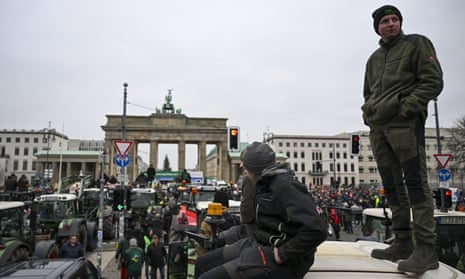
German farmers' discontent with the government has taken a chilling turn as makeshift gallows, symbolizing their anger, appeared along rural roads nationwide. The ominous display, referencing the colors of the three governing parties, foreshadows unprecedented cross-sector protests and strikes set to impact German roads and railways. This shift marks a departure from Germany's traditionally consensus-driven approach to industrial relations, raising concerns about potential repercussions.
The eight-day countrywide protest by agricultural workers, featuring motorway blockades, persists despite the government's partial reversal on diesel subsidies and farming vehicle tax breaks. The protests reached a new level of intensity when farmers blocked Vice-Chancellor Robert Habeck from disembarking a ferry, underscoring the deep-seated anger driving the demonstrations.
In a simultaneous development, freight carriers plan to join the protests against a toll hike for heavy goods vehicles, with blockades escalating to a lorry rally in Berlin on January 18 and 19. Furthermore, German train drivers, affiliated with the GDL union, intend to resume nationwide strikes over wages and working hours from Monday.
While the protests and strikes arise from diverse demands and pre-existing disputes, their concurrent occurrence provides an opportunity for far-right groups, particularly the Alternative für Deutschland (AfD), to capitalize on populist sentiments. The AfD portrays the protests on social media as ordinary citizens victimized by an irresponsible political leadership, invoking imagery of a "general strike."
Despite attempts by the German farmers' association to distance itself from far-right associations, the protests align with the AfD's narrative, potentially fueling populist fantasies. Analysts express concern that the growing frustration among farmers over bureaucratic burdens and rising costs in the past decade is being exploited by the far right to garner support.
Germany's agricultural industry, comprising approximately 256,000 businesses, plays a crucial role in maintaining half of the country's land mass. The subsidy cuts, a response to a constitutional court ruling declaring the government's long-term climate and transformation fund unconstitutional, have ignited populist anger, mainly directed at the Green party. Critics argue that while transitioning agriculture away from fossil fuels is necessary, the proposed cuts may disproportionately affect smaller farms.
As protests intensify and far-right rhetoric gains momentum, Germany faces a delicate situation that could have wider implications, particularly with key elections approaching in eastern German states. The fear is that the current revolutionary spirit may inadvertently play into the hands of a resurgent far right.
